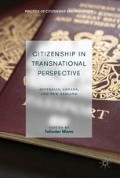Abstract
This edited collection is based on an international symposium on “Citizenship in a Transnational Perspective” that was held at the University of Alberta, Edmonton, Canada in July 2016. It brought together leading international scholars from Canada, Australia, and New Zealand to explore citizenship in a transnational perspective, focusing on the three countries through the two overarching themes of ethnicity and Indigeneity. The contributors to this collection approached the subject from a range of disciplinary perspectives: historical, legal, political, and sociological. Therefore, this book makes an important and unique contribution to the existing literature through its transnational and multidisciplinary perspectives. The contributors are engaged in cutting-edge research – including arguing for a post-citizenship world, or questioning the very concept itself, or its application to Indigenous nations.
Access this chapter
Tax calculation will be finalised at checkout
Purchases are for personal use only
Notes
- 1.
These are nations primarily in the Americas, Africa, Asia, and Australasia or Oceania, which were colonised by European Imperial powers, their settlers dispossessing the Indigenous nations already present in those territories. The effects of this extremely destructive process are still felt to this day. For the purposes of this edited collection, the settler societies that will be focused on are Australia, Canada, and New Zealand. All three of these countries subsequently received a diverse immigration intake over the course of the late nineteenth and twentieth centuries, which transformed their populations.
- 2.
Pierre Boyer, Linda Cardinal, and David Headon (Eds.), From Subjects to Citizens: A Hundred Years of Citizenship in Australia and Canada (Ottawa: University of Ottawa Press, 2004); Alan C. Cairns, John C. Courtney, Peter MacKinnon, Hans J. Michelmann, and David E. Smith (Eds.), Citizenship, Diversity, and Pluralism: Canadian and Comparative Perspectives (Montreal & Kingston: McGill-Queen’s University Press, 1999); Paul Havemann (Ed.), Indigenous Peoples’ Rights in Australia, Canada, & New Zealand (Auckland: Oxford University Press, 1999).
- 3.
James Belich, Paradise Reforged: A History of the New Zealanders from the 1880s to the Year 2000 (Honolulu: University of Hawaii Press, 2002).
- 4.
Glen Coulthard, Red Skin, White Masks: Rejecting the Colonial Politics of Recognition (Minneapolis: University of Minnesota Press, 2014).
- 5.
Marilyn Lake and Henry Reynolds, Drawing the Global Colour Line: White Men’s Countries and the International Challenge of Racial Equality (Cambridge: Cambridge University Press, 2008).
- 6.
Lorenzo Veracini, The Settler Colonial Present (Basingstoke, Hampshire, UK: Palgrave Macmillan, 2015).
- 7.
Andrew Woolford, This Benevolent Experiment: Indigenous Boarding Schools, Genocide, and Redress in Canada and the United States (Lincoln, NE, USA: University of Nebraska Press, 2015).
- 8.
Benedict Anderson, Imagined Communities: Reflections on the Origin and Spread of Nationalism (London: Verso, 1991).
Bibliography
Anderson, Benedict. Imagined Communities: Reflections on the Origin and Spread of Nationalism. London: Verso, 1991.
Belich, James. Paradise Reforged: A History of the New Zealanders from the 1880s to the Year 2000. Honolulu: University of Hawaii Press, 2002.
Boyer, Pierre, Cardinal, Linda, and Headon, David. eds. From Subjects to Citizens: A Hundred Years of Citizenship in Australia and Canada. Ottawa: University of Ottawa Press, 2004.
Cairns, Alan C., Courtney, John C., MacKinnon, Peter, Michelmann, Hans J., and Smith, David E. eds. Citizenship, Diversity, and Pluralism: Canadian and Comparative Perspectives. Montreal & Kingston: McGill-Queen’s University Press, 1999.
Coulthard, Glen. Red Skin, White Masks: Rejecting the Colonial Politics of Recognition. Minneapolis: University of Minnesota Press, 2014.
Havemann, Paul. ed. Indigenous Peoples’ Rights in Australia, Canada, & New Zealand. Auckland: Oxford University Press, 1999.
Lake, Marilyn and Reynolds, Henry. Drawing the Global Colour Line: White Men’s Countries and the International Challenge of Racial Equality. Cambridge: Cambridge University Press, 2008.
Veracini, Lorenzo. The Settler Colonial Present. Basingstoke, Hampshire, UK: Palgrave Macmillan, 2015.
Woolford, Andrew. This Benevolent Experiment: Indigenous Boarding Schools, Genocide, and Redress in Canada and the United States. Lincoln, NE, USA: University of Nebraska Press, 2015.
Author information
Authors and Affiliations
Editor information
Editors and Affiliations
Rights and permissions
Copyright information
© 2017 The Author(s)
About this chapter
Cite this chapter
Mann, J. (2017). Introduction. In: Mann, J. (eds) Citizenship in Transnational Perspective. Politics of Citizenship and Migration. Palgrave Macmillan, Cham. https://doi.org/10.1007/978-3-319-53529-6_1
Download citation
DOI: https://doi.org/10.1007/978-3-319-53529-6_1
Published:
Publisher Name: Palgrave Macmillan, Cham
Print ISBN: 978-3-319-53528-9
Online ISBN: 978-3-319-53529-6
eBook Packages: Political Science and International StudiesPolitical Science and International Studies (R0)

